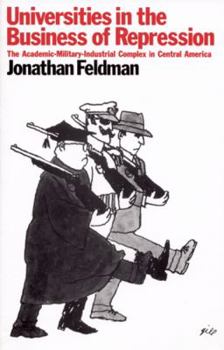Universities in the Business of Repression: The Academic-Military-Industrial Complex in Central America
This book is an essential guide for students and academics seeking to expose university complicity with militarism and repression in the Third World. Presents an activist strategy for selective... This description may be from another edition of this product.
Format:Paperback
Language:English
ISBN:0896083543
ISBN13:9780896083547
Release Date:July 1999
Publisher:South End Press
Length:382 Pages
Weight:1.00 lbs.
Customer Reviews
1 rating
Essential for those who care about demilitarization!
Published by Thriftbooks.com User , 26 years ago
The 1960s and now the 1970s are now portrayed in the corporate media nostalga machine as a combination of disco dancing and platform shoes. The activism of this period is often neglected or viewed simply as some kind of adolescent rebellion, a psychological issue. The forgetfullness regarding activism by students as well as anti-war and community groups is a byproduct of what the social historian Russell Jacoby would call "Social Amnesia." With the stock market collapsing, Nazi youth gaining recruits even in social democratic countries of Northern Europe, and homelessness reaching hundreds of thousands in New York City, I can't say that the contemplative life or New Age health movements are all that they're cracked up to be. I myself am now a regular consumer of B-6, B-12, Vitamin E and live plant enzymes and assorted anti-oxidants. But, look at how our inner cities are deteriorating and you'll long for a different kind of 1960s nostalgia. That period of 30 years ago was a time when poverty really counted as a national policy issue. Martin Luther King made the link between disarmament and the reversal of poverty. Military budgets for the Vietnam War meant less funds for housing and jobs at home. The university itself was a key institution in this equation. It became a central battle ground between students concerned with the university's role in promoting military objectives overseas and administrators who defended such links in the name of "free speech." For those with a sense of social commitment, poverty, war, and environmental decay are sometimes viewed as isolated problems. Yet, if military budgets were reduced and directed towards pressing needs, we could apply resources where they are most needed. One obstacle towards demilitarization is that we often lack a "political space" for action. Another barrier is that in the era of globalization, corporations and governments are united but activists are not. This book illustrates how the university itself can provide a space for common international action, joing citizens in the so-called developed world with others in the Third World, or "post-colonial" societies. The university is also a space where persons with political awareness of social ills live side by side with the informational, investment and political networks that support unethical transnational corporations and the military state. This book illustrates these links and provides a guidebook for those concerned with making the crucial links between demilitarization and a future worth living for.




